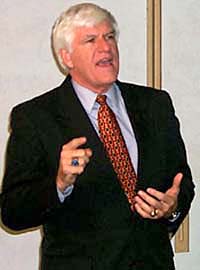Safeguarding U.S. Agriculture Is Top Priority For USDA Agency
Safeguarding U.S. Agriculture Is Top Priority For USDA Agency

A changing, more complex world means more vigilance is required to protect American agriculture from foreign pests and disease. That's the challenge facing the USDA's Animal and Plant Health Inspection Service, or APHIS, according to the agency's director.
Michael Dunn, USDA undersecretary of agriculture in charge of marketing and regulatory services, spoke recently on campus to a group of UK agriculture faculty and students as this year's Gamma Sigma Delta Distinguished Lecturer.
"The job of APHIS doesn't begin and end at our borders any longer," Dunn said. "The world has changed and the responsibilities of APHIS have evolved to a much broader role consisting of a variety of people engaged in a variety of activities that, collectively, protect against the intrusion of harmful exotic species."
Dunn said the APHIS safeguarding system consists of four components: offshore risk management, exclusion, early detection, and control- containment-eradication.
"In fiscal year 1998, APHIS officers intercepted almost 2 million potentially damaging plant and animal products from airline passengers and crew members," Dunn said. "More than 52,000 of these carried potentially harmful invasive pests or diseases."
In recent years, Dunn said, the Service has added 200 new inspectors at ports-of-entry across the country. Several projects at international airports are testing new technologies for improving the detection of smuggled biological agents. Powerful x-ray machines and specially-trained dogs can detect smuggled items even if they are well hidden in cargo or luggage. The dog program averages more than 60,000 seizures of prohibited products per year.
According to Dunn, the greatest challenge for the agency in coming years will be balancing a vigorous national safeguarding system with an export-oriented trade policy that increases opportunities for domestic agricultural producers.
"Fortunately, the World Trade Organization's 1995 Uruguay Round agreement on sanitary and phytosanitary measures has proven to be a useful framework for helping us achieve these goals in this new global environment," Dunn said. "We use this framework to provide our trading partners with scientific data indicating that U.S. products are free of pests and diseases of concern."
The undersecretary said that, as his agency prepares for a new round of WTO negotiations this year in Seattle, it continues to work with this country's trading partners to reduce unnecessary variances between countries' health-related measures and technical standards. He said USDA officials also are working closely with their European counterparts to harmonize international regulatory approaches for genetically-engineered products.
"Given the large percentage of crops that are genetically engineered, there is strong concern among our producers about whether they will be able to sell their export crops if the current international climate continues," Dunn said. "APHIS officials regularly meet with European Union representatives and key trading partners to discuss policy developments on the commercialization of, and trade in, new agricultural commodities produced through biotechnology."
